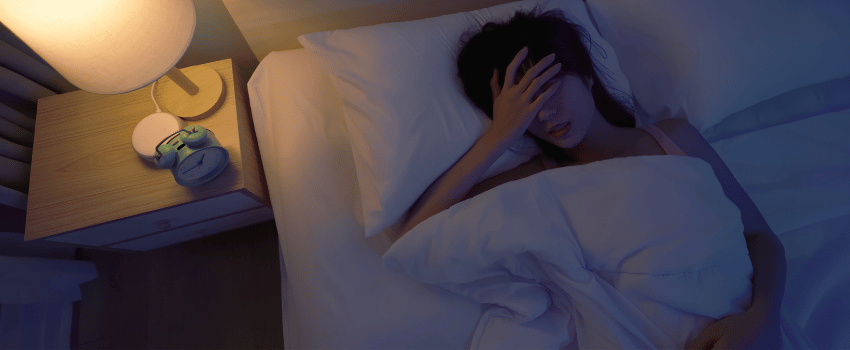
Nocturia is a common condition that affects around 40% of adults between 18 and 79. The prevalence and severity tend to increase with age, but any disturbance in your sleep routine can cause various other issues. To help you better understand why your nighttime bathroom habits may be occurring, we've put together some essential information on what causes nocturia.
What is Nocturia?
Nocturia is a condition that causes you to wake up in the middle of the night so you can go to the bathroom. It's a symptom rather than a disease itself. It's also sometimes referred to as nocturnal urinary frequency. Nocturia is considered regardless of how many bathroom trips you need to make throughout the night—as long as it's one or more times per night. While occasional nighttime urination can be normal, especially after drinking too much liquid before bed, frequent episodes may indicate an underlying health issue.
Common Symptoms of Nocturia
The primary symptom of nocturia is waking up during the night to use the bathroom. However, this can be accompanied by other symptoms, which may provide clues to other underlying conditions. Some of the most common indications of nocturia include:
- Frequent nighttime urination
- Increased urine volume at night (nocturnal polyuria)
- Increased urgency upon waking
- Trouble falling back asleep
- Reduced daytime urination
- Feeling tired, irritable, or unfocused during the day
- Increased thirst
- Unintended weight loss
- Fatigue
- Weakened urine stream
- Straining during urination
- Pain or burning during urination (urinary tract infection)
- Urinary incontinence
- Swelling in the legs and ankles
Nocturia isn't a disease on its own, so it's important to see your doctor at the first sign of any issues. You should also keep note of additional nocturia symptoms to help explain your circumstances to your doctor better.
What Causes Nocturia?
Nocturia can be caused by various factors, from lifestyle habits to underlying medical conditions. The best way to treat and manage urgency after bed is to pinpoint your cause. Some of the most common contributors to nocturia include the following:
Excessive Fluid Intake
Drinking large amounts of fluids, especially in the evening, can increase urine production at night. Certain beverages, such as caffeine and alcohol, also have diuretic properties that stimulate urine production and contribute to frequent nighttime urination.
Medications
Certain medications can increase urine output, particularly diuretics used to treat high blood pressure or heart conditions. Taking these medications later in the day can exacerbate nocturia. Other medications, such as lithium, certain antidepressants, and calcium channel blockers, may also cause frequent urges.
Reduced Bladder Capacity
Conditions that cause bladder irritation or reduced capacity, such as interstitial cystitis or overactive bladder, can lead to frequent urges to urinate throughout the day and night. These conditions make it difficult for the bladder to hold a normal amount of urine, leading to nocturia.
Unintentional Habits
Some individuals unknowingly develop habits that contribute to nocturia. For example, waking up at night for reasons unrelated to urination (such as noise, discomfort, or stress) may become associated with using the bathroom, reinforcing the habit of nighttime urination even when the bladder is not full.
Underlying Conditions
Nocturia is often a symptom of a more significant health condition. Some of the most common medical causes include the following:
- Polyuria — Polyuria refers to the production of an abnormally large urine volume, which can be caused by diabetes mellitus or excessive fluid intake.
- High Blood Pressure and Heart Disease — People with hypertension or heart disease may experience fluid retention in the lower extremities during the day. When lying down at night, this fluid is redistributed into the bloodstream, increasing urine production and contributing to nocturia.
- Obstructive Sleep Apnea and Other Sleep Disorders — Sleep apnea has been linked to nocturia due to fluctuating oxygen levels and hormonal imbalances that affect urine production.
- Pelvic Organ Prolapse — Pelvic organ prolapse can lead to bladder pressure and frequent urination at night, especially after childbirth or menopause.
- Benign Prostatic Hyperplasia — An enlarged prostate (BPH) is one of the most common causes of nocturia. An enlarged prostate can press against the bladder, causing frequent urination and difficulty fully emptying the bladder.
- Neurologic Conditions — Conditions such as multiple sclerosis, Parkinson’s disease, and spinal cord injuries can disrupt nerve signals to the bladder, leading to overactive bladder symptoms and nocturia.
- Diabetes — People with diabetes or conditions that cause fluid retention (such as kidney disease or congestive heart failure) often experience nocturia as excess fluids shift within the body during sleep.
- Obesity — Excess body weight can increase abdominal pressure, which puts stress on the bladder and contributes to more trips to the bathroom.
- Pregnancy and Menopause — Pregnancy increases pressure on the bladder, leading to frequent urination. Similarly, menopause can alter bladder function due to changes in estrogen levels, increasing the likelihood of nocturia.
- Anxiety — Stress and anxiety can contribute to nocturia by triggering an overactive bladder response. Additionally, people experiencing high stress levels may drink excessive fluids at night, compounding the issue.
- Infection — Urinary tract infections (UTIs), bladder infections, and kidney infections can cause increased urinary urgency and frequency, including at night. These infections are often accompanied by pain or burning during urination.
In rare cases, the cause of nocturia may be a tumor on the bladder or prostate. It could also be caused by liver failure or diabetes insipidus (a rare condition that leads to intense thrust and excessive production of urine). While most instances of nocturia are nothing to worry about, it's still important to see your doctor and undergo diagnostics.
Is Nocturia Harmful?
Nocturia itself isn’t necessarily harmful, but its effects and underlying causes can pose risks to your health and well-being. Excessive sleepiness caused by ongoing disruptions can have several negative consequences. Over time, chronic sleep deprivation can lead to daytime fatigue, difficulty concentrating, irritability, and mood disturbances, all of which can impact daily functioning and quality of life. Nocturia can also increase the risk of falls and injuries in older individuals, as getting up and going to the bathroom in the dark doesn't usually make for smooth navigation. Additionally, if nocturia is a symptom of an underlying health condition that requires treatment, leaving it unaddressed may cause further complications. Therefore, it's important to undergo diagnostics and treatments if you experience frequent urination at night.
How is Nocturia Diagnosed?
During your appointment, your doctor will likely ask you some questions to better understand what's happening. To help prepare for your appointment, consider the following:
- How many times do you wake up at night to urinate?
- How often do you urinate during the day?
- Do you feel an urgent need to urinate during the day?
- Do you experience frequent urination both day and night or only at night?
- When did you first notice this symptom?
- Do you feel the urge to urinate immediately upon waking, or do you wake up first and then decide to urinate?
- Do you pass a large amount of urine at night or just a small amount?
- Do you feel like your bladder is fully emptied when you urinate at night?
- Do you experience any pain or burning when urinating?
- Do you have difficulty starting or stopping your urine stream?
- Do you have any leakage or incontinence at night?
- How much fluid do you drink in the evening or before bed?
- Do you consume caffeine or alcohol in the evening?
- Do you snore, or has anyone told you that you stop breathing during sleep?
- Do you feel rested when you wake up in the morning?
These questions can help your doctor understand whether you need to be tested for other health conditions or sleep disorders and which lifestyle changes may be most effective.
Afterward, your urologist may order one or more of the following tests:
- Urinalysis
- Urodynamic testing
- Blood test
- Imaging tests
- Bladder scan
- Cystoscopy
These will help determine whether an underlying medical condition is present and how to treat it. Don't hesitate to talk to your doctor if you have any questions or concerns during the process.
Treatment Options for Nocturia
Treatment will depend on the underlying cause, so it's important to discuss your symptoms with your doctor and undergo testing. Some possible options to help address nocturia include:
- Limit evening fluid intake
- Avoid bladder irritants
- Elevate your legs during the day
- Reduce sodium intake to manage fluid retention
- Medications (i.e., desmopressin, anticholinergics, beta-3 adrenoceptor agonists, alpha-blockers)
- Bladder training
- Pelvic floor exercises
- Hormone therapy
If nocturia is caused by an underlying condition, managing that condition should help you sleep through the night. To help ensure you have what you need to deal with these issues, Byram Healthcare offers a wide range of urologic products to alleviate symptoms and take control of your life. Browse our urology product catalog today and enjoy fast, discreet delivery directly to your doorstep.




